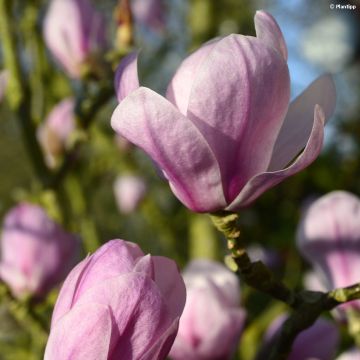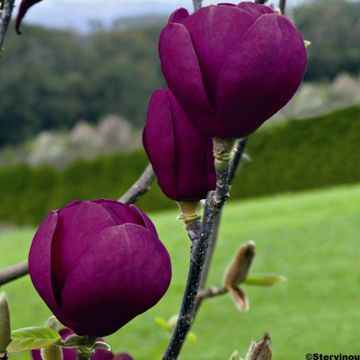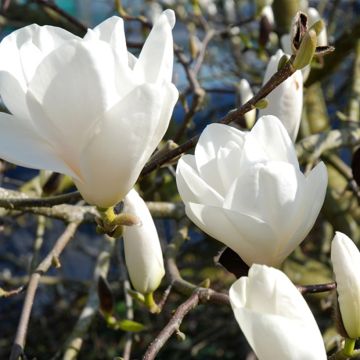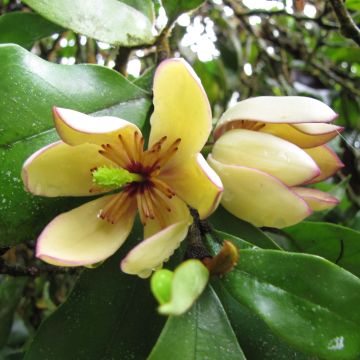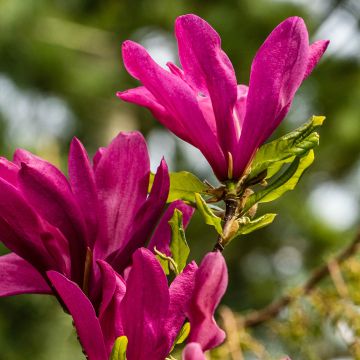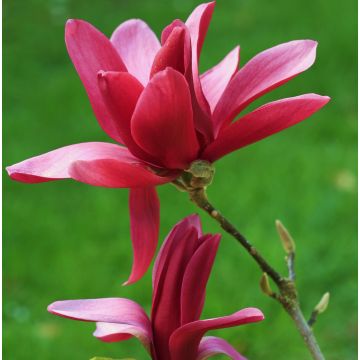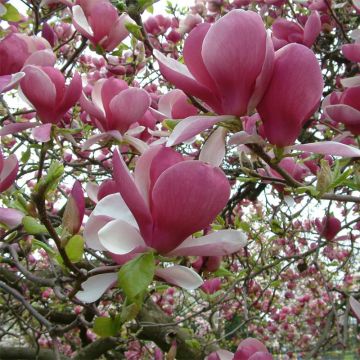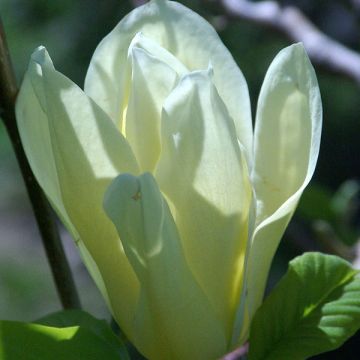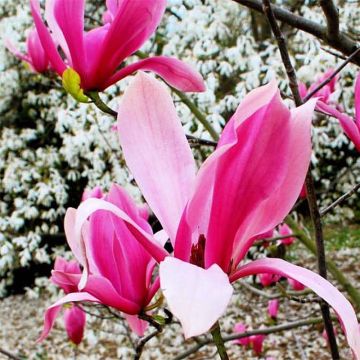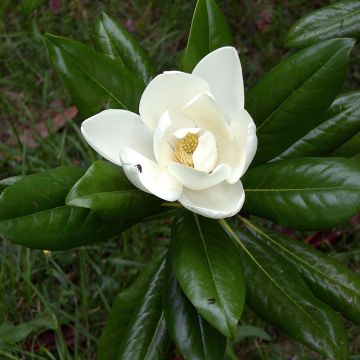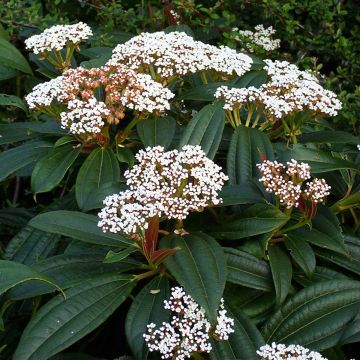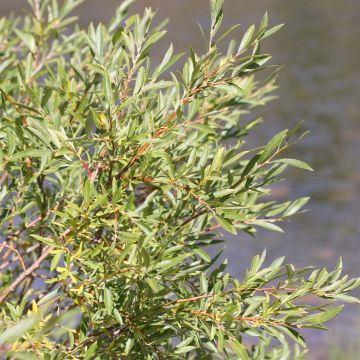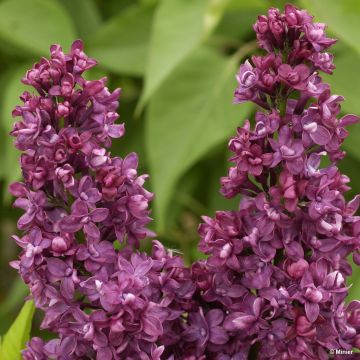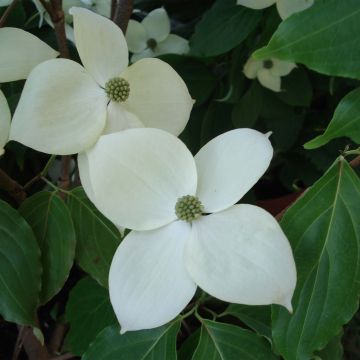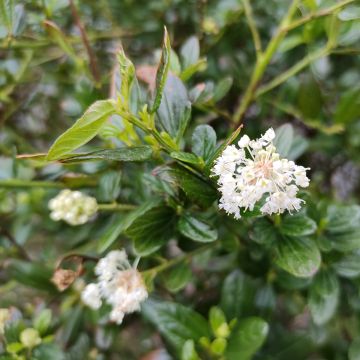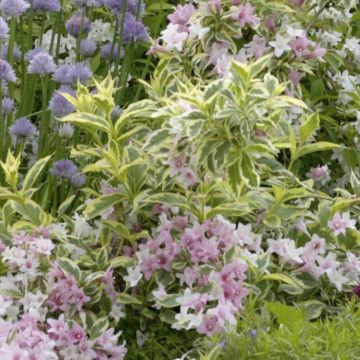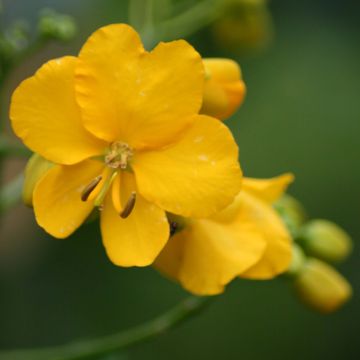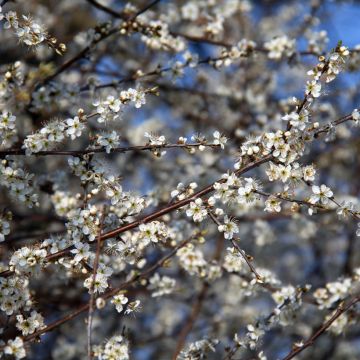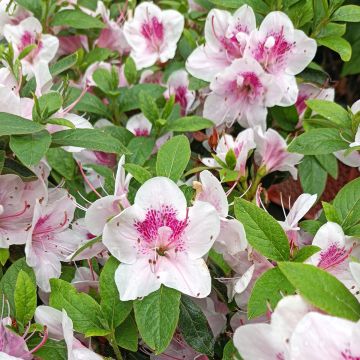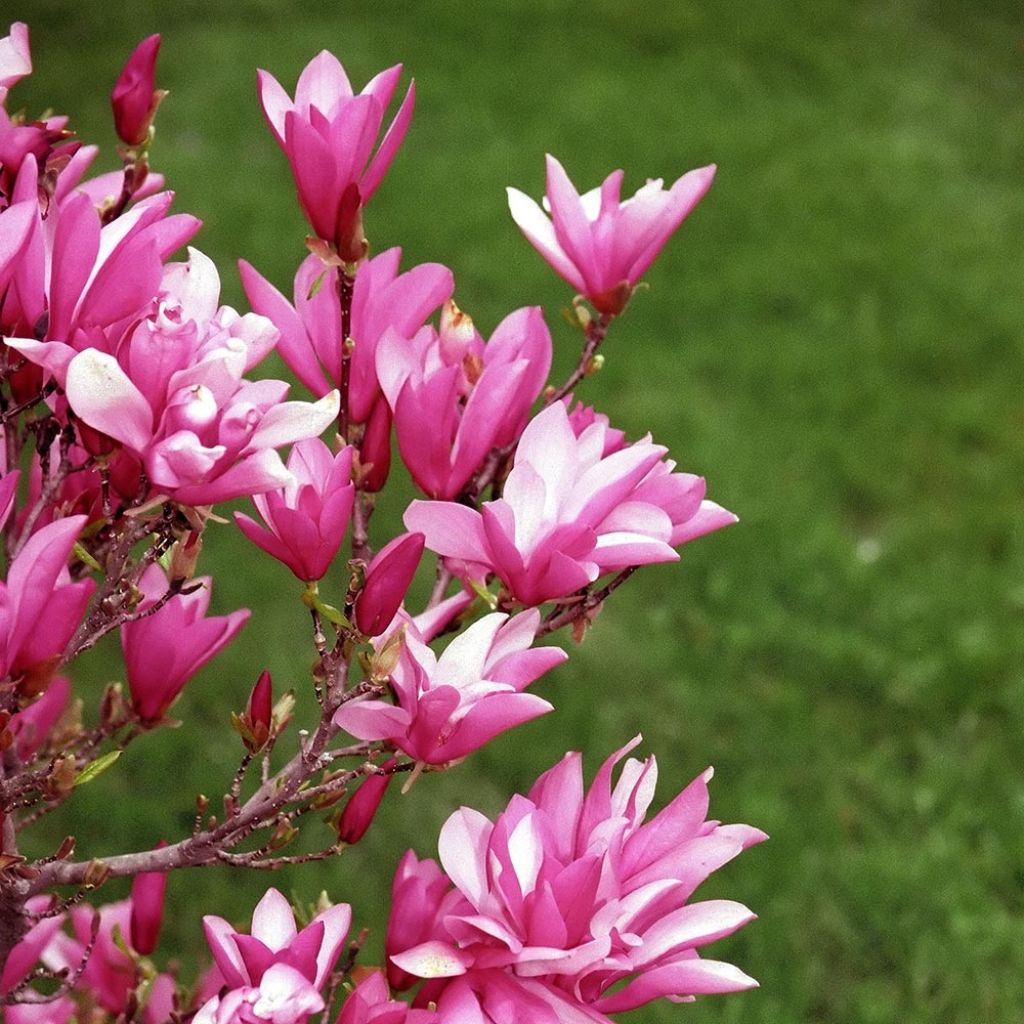

Magnolia Betty
Magnolia Betty
Magnolia Betty
Magnolia
This item cannot be shipped to the selected country
Delivery charge from €5.90
Delivery to Corse prohibited
More information
Schedule delivery date,
and select date in basket
This plant carries a 24 months recovery warranty
More information
We guarantee the quality of our plants for a full growing cycle, and will replace at our expense any plant that fails to recover under normal climatic and planting conditions.
From €5.90 for pickup delivery and €6.90 for home delivery
Express home delivery from €8.90.
Delivery to Corse prohibited: UE law prohibits the import of this plant from mainland France to Corse as part of the fight against Xylella fastidiosa. Please accept our sincere apologies.
More information

Does this plant fit my garden?
Set up your Plantfit profile →
Description
Magnolia 'Betty' is a beautiful hybrid variety that combines a spectacular spring flowering with moderate growth. These qualities make this small, round-shaped and well-branched tree an excellent candidate for small gardens and container cultivation. It offers an extraordinary spectacle when its numerous flowers appear, beautifully colored in two shades of pink, opening up into magnificent star-shaped blooms that can reach 20 cm (8in) in diameter, visible from afar on its still leafless branches. Like many magnolias, it thrives in moist, neutral to acidic soils, in full sun or partial shade.
This Magnolia, belonging to the magnolia family, is a horticultural creation resulting from cross-breeding between the Magnolia liliiflora 'Nigra', with lily-shaped flowers, and the Magnolia stellata var. 'Rosea', highly floriferous, compact in size and more adaptable to different soil conditions. This slow-growing small tree, with a well-branched rounded crown, reaches a height and spread of approximately 3.50 meters (11 feet) after about fifteen years. If grown in a container, it will maintain more modest dimensions. Its flowering takes place in April-May, depending on the region. Its flowers open abundantly on its bare branches. They are large, solitary and lightly fragrant, upright flowers, with a shape reminiscent of tulips. These flowers open widely, forming star-shaped blooms measuring 18 to 20 cm (7 to 8 in) in diameter. They consist of oval and pointed petals, with a thick and waxy texture. They emerge from buds protected by silky bracts. The center of each flower is occupied by numerous yellow stamens and a large greenish pistil. The deciduous foliage is made up of obovate leaves, 15 cm (6in) long and 5-6 cm (2in) wide, of a medium green color, slightly hairy, with a paler and finely hairy underside, turning to yellowish-brown in autumn before falling.
This Magnolia Betty offers an unforgettable spectacle in the middle of spring. As an excellent ornamental tree, it finds its place in many gardens, including smaller ones. It is most often used as a solitary specimen in the middle of a short grass meadow, where its flowering is particularly striking. It can also be integrated into a mixed border of flowering shrubs (large Rhododendrons, Camellias, Hydrangeas, Witch Hazels, Pieris, Anemone Trees, Fothergilla...), for a Japanese-style garden. It is also possible to create large flowering hedges when space allows, alternating this Magnolia with other cultivars (Magnolia Heaven Scent, Magnolia denudata, stellata, brooklyniensis, Merrill...). Finally, gardeners without a garden can cultivate it for many years in a large container, on a terrace or balcony.
Its name, Magnolia, was given to it in 1703 by Charles Plumier, botanist to King Louis XIV, thus paying homage to the physician-botanist Pierre Magnol (1638-1715), who was one of the directors of the Botanical Garden of Montpellier at the end of the 17th century. Its specific name, soulangeana, originates from Etienne Soulange-Bodin (1774-1846), a retired cavalry officer from Napoleon's army who dedicated himself to horticulture. In his château de Fromont, near Paris, he developed a passion for Magnolias and obtained this hybrid in 1829, which is now the origin of a magnificent line of cultivars!
Report an error about the product description
Magnolia Betty in pictures
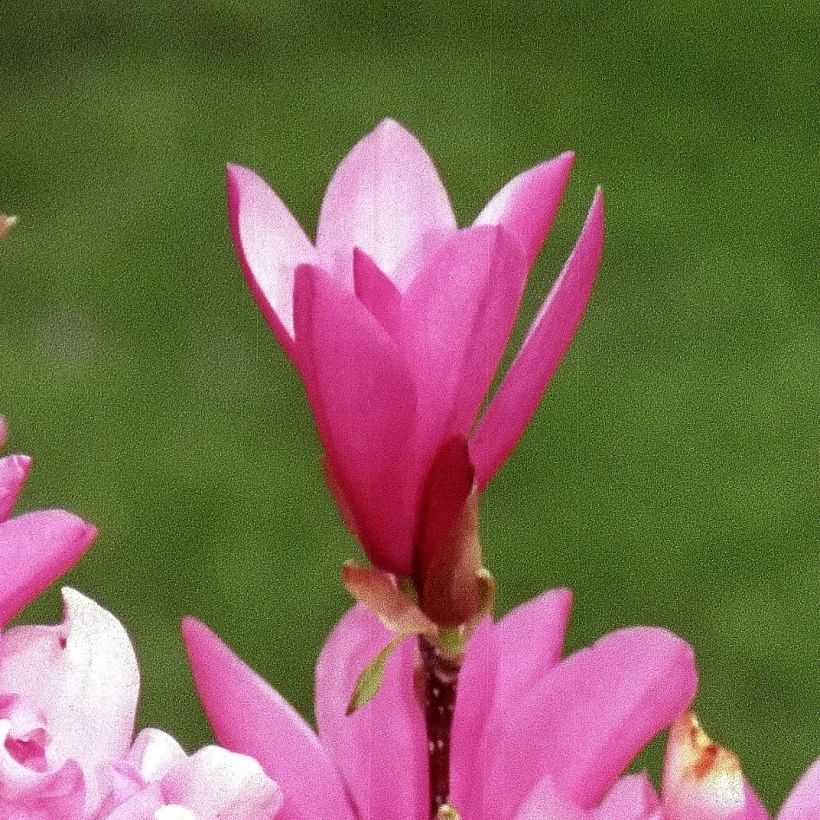

Plant habit
Flowering
Foliage
Botanical data
Magnolia
Betty
Magnoliaceae
Magnolia
Cultivar or hybrid
Other Magnolia
Planting and care
Magnolia 'Betty' prefers sheltered situations, sunny to partially shaded exposures, a moist, well-drained, rich soil, devoid of limestone, neutral or acidic. It dislikes soils that are too dry, windy locations, or root competition, as its root system is shallow. With good hardiness (up to -15°C (5°F)), it is however advisable to protect young plants from frost in the first years following planting. Note that late frosts and cold winds can damage flower buds and young leaves, thus affecting flowering.
Magnolia can be planted in spring or autumn, outside the frost or heat period, ensuring it is sheltered from cold winds. Provide a hole of 80 cm (32 in) on each side and depth, with a good supply of ericaceous compost and mulch. Take care to gently place it in the hole, so as not to break the fleshy but fragile roots. Immediate watering, preferably with lime-free water (rainwater), helps to settle the soil around the roots. During the first year of planting, Magnolia requires watering once a week. It will appreciate an annual mulch around its base to retain moisture during the hot season, enrich its soil, and protect it from the cold in winter. As its roots are fragile, transplanting should be avoided. The only enemies of Magnolia are pests such as scale insects, snails, and slugs that attack young plants, and diseases such as root rot (in overly waterlogged soil), coral disease, and Pestalozzia. It should be noted that magnolias are ornamental trees that tolerate air pollution well.
Planting period
Intended location
Care
This item has not been reviewed yet - be the first to leave a review about it.
Spring-flowering shrubs
Haven't found what you were looking for?
Hardiness is the lowest winter temperature a plant can endure without suffering serious damage or even dying. However, hardiness is affected by location (a sheltered area, such as a patio), protection (winter cover) and soil type (hardiness is improved by well-drained soil).

Photo Sharing Terms & Conditions
In order to encourage gardeners to interact and share their experiences, Promesse de fleurs offers various media enabling content to be uploaded onto its Site - in particular via the ‘Photo sharing’ module.
The User agrees to refrain from:
- Posting any content that is illegal, prejudicial, insulting, racist, inciteful to hatred, revisionist, contrary to public decency, that infringes on privacy or on the privacy rights of third parties, in particular the publicity rights of persons and goods, intellectual property rights, or the right to privacy.
- Submitting content on behalf of a third party;
- Impersonate the identity of a third party and/or publish any personal information about a third party;
In general, the User undertakes to refrain from any unethical behaviour.
All Content (in particular text, comments, files, images, photos, videos, creative works, etc.), which may be subject to property or intellectual property rights, image or other private rights, shall remain the property of the User, subject to the limited rights granted by the terms of the licence granted by Promesse de fleurs as stated below. Users are at liberty to publish or not to publish such Content on the Site, notably via the ‘Photo Sharing’ facility, and accept that this Content shall be made public and freely accessible, notably on the Internet.
Users further acknowledge, undertake to have ,and guarantee that they hold all necessary rights and permissions to publish such material on the Site, in particular with regard to the legislation in force pertaining to any privacy, property, intellectual property, image, or contractual rights, or rights of any other nature. By publishing such Content on the Site, Users acknowledge accepting full liability as publishers of the Content within the meaning of the law, and grant Promesse de fleurs, free of charge, an inclusive, worldwide licence for the said Content for the entire duration of its publication, including all reproduction, representation, up/downloading, displaying, performing, transmission, and storage rights.
Users also grant permission for their name to be linked to the Content and accept that this link may not always be made available.
By engaging in posting material, Users consent to their Content becoming automatically accessible on the Internet, in particular on other sites and/or blogs and/or web pages of the Promesse de fleurs site, including in particular social pages and the Promesse de fleurs catalogue.
Users may secure the removal of entrusted content free of charge by issuing a simple request via our contact form.
The flowering period indicated on our website applies to countries and regions located in USDA zone 8 (France, the United Kingdom, Ireland, the Netherlands, etc.)
It will vary according to where you live:
- In zones 9 to 10 (Italy, Spain, Greece, etc.), flowering will occur about 2 to 4 weeks earlier.
- In zones 6 to 7 (Germany, Poland, Slovenia, and lower mountainous regions), flowering will be delayed by 2 to 3 weeks.
- In zone 5 (Central Europe, Scandinavia), blooming will be delayed by 3 to 5 weeks.
In temperate climates, pruning of spring-flowering shrubs (forsythia, spireas, etc.) should be done just after flowering.
Pruning of summer-flowering shrubs (Indian Lilac, Perovskia, etc.) can be done in winter or spring.
In cold regions as well as with frost-sensitive plants, avoid pruning too early when severe frosts may still occur.
The planting period indicated on our website applies to countries and regions located in USDA zone 8 (France, United Kingdom, Ireland, Netherlands).
It will vary according to where you live:
- In Mediterranean zones (Marseille, Madrid, Milan, etc.), autumn and winter are the best planting periods.
- In continental zones (Strasbourg, Munich, Vienna, etc.), delay planting by 2 to 3 weeks in spring and bring it forward by 2 to 4 weeks in autumn.
- In mountainous regions (the Alps, Pyrenees, Carpathians, etc.), it is best to plant in late spring (May-June) or late summer (August-September).
The harvesting period indicated on our website applies to countries and regions in USDA zone 8 (France, England, Ireland, the Netherlands).
In colder areas (Scandinavia, Poland, Austria...) fruit and vegetable harvests are likely to be delayed by 3-4 weeks.
In warmer areas (Italy, Spain, Greece, etc.), harvesting will probably take place earlier, depending on weather conditions.
The sowing periods indicated on our website apply to countries and regions within USDA Zone 8 (France, UK, Ireland, Netherlands).
In colder areas (Scandinavia, Poland, Austria...), delay any outdoor sowing by 3-4 weeks, or sow under glass.
In warmer climes (Italy, Spain, Greece, etc.), bring outdoor sowing forward by a few weeks.

































